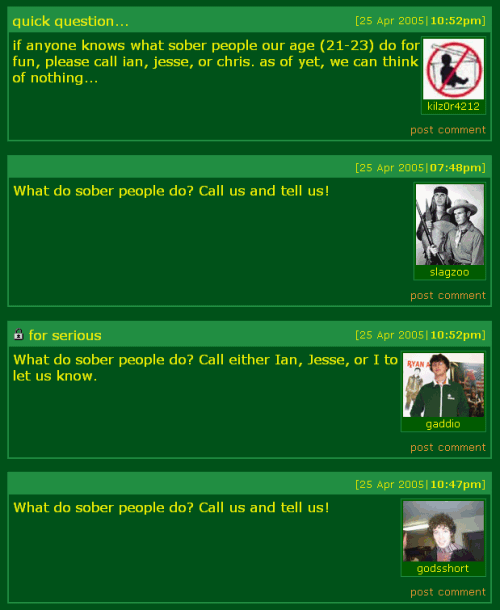I wish I felt more authentic about liking Ted Leo and the Pharmacists. Basically the whole interweb told me they were good, then Maria told me I’d like them, then Ian played me the CD, and everyone was right. It was like being spoonfed. I wish I’d never heard of them until I heard them. I wish I’d walked in halfway through their set opening for somebody else and they’d started “Me and Mia,” and there’d be sweat spraying off me, pain in my ears, the way I used to dance before I worried about my spine.
Category: Family
Today’s Hitherby Dragon, The Land Where Suffering Is Remembered, is one of the best I can remember. It reminds me of a story we used to listen to in the car all the time, about frogs and a witch and three dogs and grains of magic corn. My mother knows a magic trick, which she used when telling this story aloud, to make a glass of milk turn blood-red.
My mother is flying to London now, with my great-aunt and -uncle and her best friend. Be safe, Mom.
Epiphany Meal #2
Yesterday my sister Caitlan arrived in Cincinnati, home safe from a three-week (I think) trip to Greece and Italy. Caitlan sucks. But actually she rules.
Before we let her sleep, my family went to dinner at Le Relais, where Ian’s roommate Jesse is a chef. Jesse had arranged a “tasting” for us, which was pretty cool–we got VIP treatment at what is widely considered the best restaurant in Louisville, if not Kentucky.
I was expecting a selection of small courses, which is kind of what we got, only there were six courses plus dessert, and even with small portions that was still a tremendous amount of food. Every bite was incredible. Duck breast and paté with whole-grain dijon, pan-seared sea scallops and hyacinth bulbs (!), medium-rare fillet in veal reduction sauce, five kinds of cheese and pistachio pound cake with saffron ice cream. And I don’t even like cheese! My favorite was the pan-fried red grouper in lobster stock reduction, which was like eating butter if butter was a fish.
Like the first Epiphany Meal, I felt a bit transformed afterward (and not just because I could barely move). I never really knew I liked French food. Maybe it would have been better for my waistline if I still didn’t.
NOT COOL. My mom is supposed to leave for London tomorrow. That is quite enough with the bombing.
Only two fatalities so far, but as of this morning there were still people trapped underground.
Update 1046 hrs: Thirty-three.
Update 1329 hrs: Thirty-seven.
Toward Transparency
Writing transparently is hard–harder, I’ve discovered, than just relaxing copyright or creating collaboratively. Most of the time I still can’t bring myself to do it.
Most writers don’t even consider transparency an option; for that matter, neither do most readers–witness spoiler space. There’s a very strong trend in Western culture toward the idea that a) all good stories must have mysteries revealed within them and b) to reveal such mysteries to someone else when that someone hasn’t read the whole thing is taboo. Mentioning that it’s a sled, for example, is synonymous with “ruining” the relevant work.
But it wasn’t always so, and it isn’t always now.
Go ahead, try to think of the last movie, TV show or novel you watched or read that didn’t feel the need to hand you a Shocking Twist in its third act. Police procedurals and courtroom dramas are desperate for this, as are reality shows. Sitcoms depend on inducing revelation in both audiences and characters within the show. I think it’s impossible to find a modern horror movie that is not also a mystery–to the point where some such movies now add a third pseudoconclusion to fake out the people who were prepared for the second one.
I submit to you that this is weak and unnecessary writing.
By now you probably have thought of a story you know without a big revelation, but I’m willing to bet it wasn’t the first thing that came to mind, or the second. My own exemplar is The Laramie Project, and it was Dr. Tony Haigh’s commentary on my Drama senior statement two years ago that made me understand why it was different. I talked a lot about our production of Laramie in my speech, and Tony came up to me afterwards–only a little drunk–to say “I hope you learn to write with that same transparency.”
I was like “oh, I don’t?” and then “Oh. I don’t.”
So there’s transparency in what you’re writing, which makes it stronger by eliminating the weakness of Shocking Twist gimmickry. And then there’s transparency in creative process, which not even McGrath proposed, but which the concept of open source has made a sudden possibility.
What if you let your readers see the story developing as you come up with it? Anathema. Scandal. They’ll realize it didn’t just burst from your forehead! They’ll see the stupid things you did in drafts. They’ll know about the Shocking Twist. There won’t be any anticipation, any hunger! So let’s print our script on copy-proof red paper and post guards around the soundstage; let’s pollute the rumor mills and drop hints without context in our blogs. As Zed Lopez points out, it’s hard to imagine a writer letting you see his or her process the way some painters do.
I submit to you that these are weak and unnecessary choices.
Which isn’t to say I do it well, or at all. Like I said, it’s hard. But I don’t believe that hiding information makes it more valuable in a positive way, and I’m going to try letting go of that. I’m not going to talk about the process of every story I write here, because it would be boring, but I’m going to try not to be coy about where they’re going.
He was sending text messages during his own commencement.
My brother graduated! From college! CONGRATULATIONS, IAN!
Obligatory reflection
Thanks for everybody who called, wrote or commented to send me birthday wishes, and to all the people who showed up at my partylike entity. You’re all great! And I am made happy by material possessions: DC gave me more of the awesome restricted-access Actors Theatre notebooks, and Maria gave me about a jillion books and DVDs and an ice cream cake and apparently something else that hasn’t arrived yet, and Lisa gave me–exclamation marks!–my first-ever illustrated story! (Of Fortado.)
Despite my inexplicable knee-jerk belief of the past several months that I’ve been 26, I’m 24. Tonight I sent off the third-to-last thing I have to do to graduate. Almost done.
It doesn’t honestly feel like I’ve lived in Louisville that long. I feel so much more competent now, in so many areas, than I did two years ago: working with humans, writing code, writing, traveling, using public transportation, applying the principles of aikido to solve nonphysical conflicts–all the things I want to spend my whole life doing.
Also, I think this is the year my brain starts dying!
Pookie
He was a canine Houdini, absolutely brilliant at escaping whatever fences, gates or other barriers we could set up to keep him safe. He was brick-stupid about everything else: glass doors, bigger dogs, cars. Those two things in combination don’t make for a long life expectancy; it’s kind of surprising that he lived to be eleven.
Pookie was always nominally my dog, although Ian took care of him more often, and after we moved out he was really my mom’s. She found him, Friday afternoon, on the wrong side of the fence around Kelly Ridge. There wasn’t any real evidence of what exactly happened. Could have been a car, or another dog, or some unknown medical problem.
He was a shih tzu, the kind you see like little furry hovercraft on shows: glossy, legless, gliding. Pookie never looked like that. His fur was short, tangled and dirty; he smelled like a dog. He lived outdoors, and always seemed satisfied with that.
After Mom sold the house, Pookie spent much more time with Joe and his giant antisocial dog, Greg Brown, out on the ridge. I don’t know how Greg and Pookie first behaved around each other, but by the time I saw them together they were inseparable. Pookie was already nine, but he acted like a dog finally growing up: his body got thicker and more muscular, and he seemed more reserved, less goofy. Greg never let anyone he didn’t trust near his protege.
When he was wet he looked like a rat, but when his hair was just the right length he looked like those Chinese statues of lions. I’ve never met anyone more confident, or more trusting, or who spent his entire life in such a happy mood.

